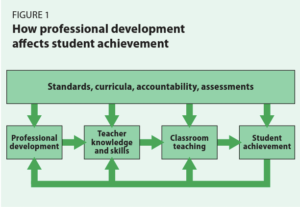It is no secret that effective professional development is a contributing factor to improved classroom instruction and student achievement.
Examining the Research
Good teachers are the foundation of good schools, and when leaders invest time and money into enhancing educators’ knowledge and skills, there are significant positive impacts. In fact, research suggests that teachers who receive substantial, high-quality professional development can boost their students’ achievement by roughly 21 percentage points.
Research on how teacher professional development affects student achievement dates back to the 1960s and can be broken up into two waves. The first wave focused on teacher skills like providing clear demonstrations, maintaining attention, etc. The second wave, which began in the 1990s, focused on the subject matter and how students learn each subject.
In an article about these studies written by Learning for Justice, it is suggested that professional development can influence teachers’ classroom practices significantly and lead to improved student achievement when it focuses on:
- How students learn particular subject matter
- Instructional practices that are specifically related to the subject matter and how students understand it
- Strengthening teachers’ knowledge of specific subject-matter content.
Connecting Professional Development to Student Learning
Effective professional development should provide teachers with not only the skills and knowledge they need but also with ways to directly apply what they learned in the classroom. When professional development connects to the materials teachers use, district and state academic standards, and assessment and evaluation of their success, professional development leads to improved student learning.
Effective professional development should provide teachers the opportunity to improve their overall knowledge of the subject matter as well as provide methods for classroom application. IMSE does just that, by providing teachers with the tools and techniques they need to make an impact in their classroom on day one.
A 2010 study, Professional Development in the United States: Case Studies of State Policies and Strategies, states, “Research evidence supports the notion that investing in and supporting professional development that is ongoing, intensive, and connected to practice and school initiatives; focuses on the teaching and learning of specific academic content, and builds strong working relationships among teachers makes a difference in student achievement.”
Not only should effective professional development provide teachers with the tools and techniques they need to make an impact, but should also provide mentorship as educators implement what they learn in their classrooms.
After participating in an IMSE training, teachers are now part of the IMSE Alumni Community and will be supported throughout the implementation of IMSE OG in their classroom. IMSE supports teachers through:
- Support sites and post-training emails
- Classroom implementation support
- Guided coaching
- Online lesson planning tools
- Online IMSE alumni support communities
- Additional trainings, certifications, and district trainer opportunities
IMSE’s experts are here to help educators throughout this journey long after the completion of one of our training sessions. Our 25-year history has taught us the best practices that are required for student achievement and the importance of ensuring program fidelity year-over-year.
Quality Professional Development Does Have an Impact on Student Achievement
The ideal Professional Development should be substantial and connect with the subject being taught directly, connect with the way students learn and the classroom curriculum, and provide mentorship to teachers as they bring what they learned into their classrooms.
Professional development affects student achievement through three steps:
- Enhances teacher knowledge and skills
- Improves classroom teaching
- Raises student achievement
If one of these three steps is missing or ineffective, then student learning cannot be expected to improve. For example, if a teacher does not apply the knowledge obtained from professional development, then students will not benefit.

Source: Reviewing the evidence on how teacher professional development affects student achievement, REL 2007–No. 033
IMSE takes the hard work away from teachers by providing them with everything they need to bring what they learn during their IMSE Impact training directly into their classroom. By offering educators products, certifications for fidelity, lesson-planning tools, mentorship, and more, district and school leaders can be confident that they are taking the best steps toward student achievement in the classroom.
Resources
- https://certificationmap.com/blog/professional-development-student-learning/
- https://ies.ed.gov/ncee/edlabs/regions/southwest/pdf/rel_2007033.pdf
- https://edpolicy.stanford.edu/sites/default/files/publications/teacher-professional-learning-united-states-case-studies-state-policies-and-strategies_2.pdf
- https://www.learningforjustice.org/professional-development/teaching-teachers-pd-to-improve-student-achievement
Please connect with us on Facebook, Twitter, Instagram, LinkedIn, and Pinterest to get tips and tricks from your peers and us. Read the IMSE Journal to hear success stories from other schools and districts, and be sure to check out our digital resources for refreshers and tips.
